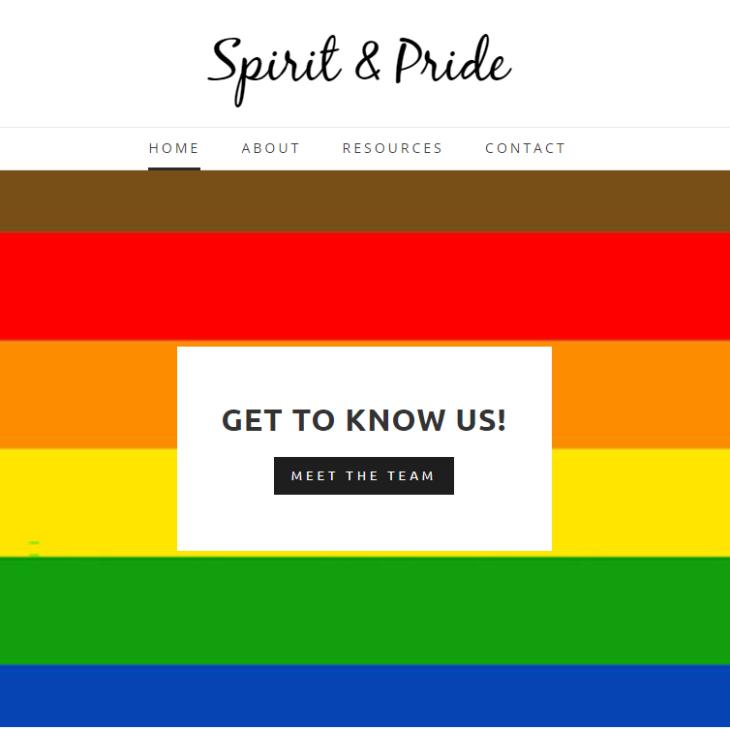This Pride Month, Let’s Talk About Interfaith
June 24, 2021

Can experiences with religious diversity improve college students’ attitudes about sexual diversity? It turns out they can.
The FBI reported at the end of 2020 that hate crimes in the United States were at their highest levels in more than a decade. At IFYC, we are closely attuned to the impact of such crimes on college and university campuses, particularly those motivated by religious bias. We know that religiously motivated hate crimes can create a hostile environment in which students are reluctant to practice and share their beliefs. In turn, a lack of meaningful encounters between people who orient around religion differently can fuel the very stereotypes and fears that lead to harmful acts of destruction and violence in the first place.
In 2015, IFYC partnered with Dr. Alyssa Rockenbach at North Carolina State University and Dr. Matthew Mayhew at The Ohio State University to learn more about the collegiate experiences that cultivate positive attitudes toward people with different religious, spiritual, or secular worldviews. Through the Interfaith Diversity Experiences and Attitudes Longitudinal Survey (IDEALS), we learned a great deal about the power of supportive spaces—as well as various interfaith interactions—to nurture an appreciation for religiously diverse groups during the first year of college. What we didn’t discover until more recently was that these experiences similarly improved first-year students’ attitudes toward queer-spectrum individuals—those who identify as gay, lesbian, bisexual, or who claim another minoritized sexual orientation.
As we celebrate Pride Month this June, it seems appropriate to lift up findings from IDEALS that could improve the campus climate for students of diverse religious identities and sexual orientations, and offer examples of institutions that are leading the charge in this regard. Below are several key practices we recommend prioritizing in higher education spaces, particularly in work with first-year students:
Convey institutional support for spiritual expression. Students in IDEALS who perceived higher levels of support for their spiritual expression on campus grew in their appreciation for both religiously diverse others and queer-spectrum people. So, what does support for spiritual expression look like? It can include ensuring a student feels safe expressing their worldview around campus and is accommodated when they need to honor important religious, spiritual, or secular observances. At the University of Michigan, a member of IFYC’s campus network, as well as an institution recognized by Campus Pride for its commitment to LGBTQ inclusion, support for spiritual expression, is conveyed by providing multiple reflection rooms across campus—and a directory for accessing them.
Encourage participation in structured interfaith activities. IDEALS also found that students who participate in two or more co-curricular activities in the first college year exhibit more positive attitudes toward queer-spectrum individuals, and both curricular and co-curricular engagement impact students’ interfaith attitudes. Augsburg University and Elon University are two other institutions with 5-star ratings from Campus Pride that have also demonstrated enduring commitments to interfaith diversity and inclusion. At Augsburg, “situated in a neighborhood home to numerous immigrant communities and with an increasingly diverse student body,” Interfaith Scholars, Interfaith Fellows, and Interfaith Ally Training programs offer opportunities for engagement and skill-building. In the curricular space, Elon offers an Interreligious Studies minor that helps students “analyze the character of an interreligious encounter, think critically about interfaith dialogue, and function effectively in multireligious and multicultural contexts.”
Challenge assumptions and prompt perspective-taking. The IDEALS survey captures whether students have experienced “provocative encounters” on campus, which are defined as challenging yet productive interactions with people of diverse worldviews. In the first collegiate year, provocative interfaith encounters were associated with more positive attitudes toward people with different religious beliefs as well as queer-spectrum individuals. Educators can be intentional about challenging assumptions and prompting perspective-taking in myriad spaces across campus. The University of Michigan’s Trotter Multicultural Center curates resources that faculty or staff can use to “promote reflection and critical thinking around religious, spiritual, and secular identities.” Elon’s Truitt Center for Religious and Spiritual Life has partnered with the university’s Gender and LGBTQIA Center to support a cohort of Spirit and Pride interns who coordinate programs and resources to “support the spiritual lives of LGBTQIA+ students.” Offerings like these undoubtedly expose students to different perspectives on sexuality through a faith lens.
This research reinforces what many higher education leaders have long understood through their lived experiences—improving the climate for diversity and inclusion doesn’t occur in silos. With this in mind, let’s start talking about interfaith this Pride Month. By doing so, we can ensure students with diverse worldviews feel welcome and supported on campus. In turn, these students may be more inclined to engage in activities that can ultimately enhance their appreciation for people holding an array of religious, spiritual, secular, or sexual identities. The promise of interfaith engagement as a tool for supporting students across the queer spectrum is certainly something worth celebrating this June.
We thank Laura Dahl, Assistant Professor at North Dakota State University, and Rebecca Crandall, Senior Lecturer at The Ohio State University, for providing the IDEALS findings cited in this article.
Share
Related Articles
American Civic Life
American Civic Life
Faith Based Efforts Work in Vaccine Uptake: Now Let’s Make it Easy
American Civic Life
Is This a Time for Bridgebuilding? 5 Leaders in Conversation



